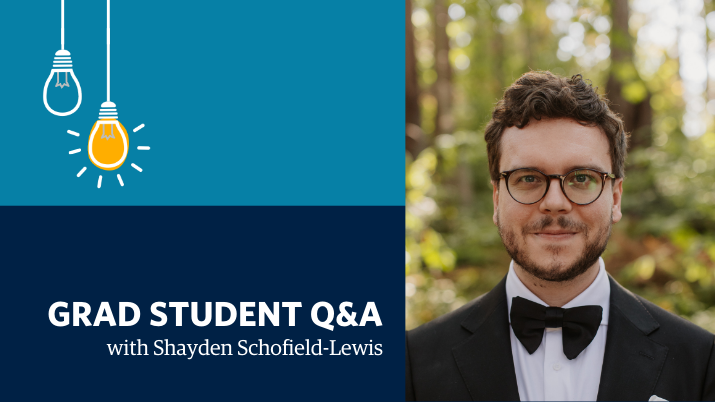

From a young age, Shayden Schofield-Lewis wanted to better understand the world around him. This led him to investigate how our brain makes decisions.
Shayden Schofield-Lewis (he/him), a behavioural neuroscience doctoral student, is conducting research under the supervision of Dr. Stan Floresco at the Neural Circuits and Cognition Laboratory. His research explores how the brain makes decisions with a focus on altered decision-making tendencies associated with addiction and the impact of drugs on cognition and behaviour.
“I look at how our brain helps us arrive at a decision. In many different mental conditions, a similar symptom is altered decision-making tendencies. I want to figure out which regions are contributing to these changes in decision-making. More than just identifying the regions, I want to see what kind of information those regions contribute to the decision-making process.”
In a Q&A, Shayden shares new research he’s excited about, the inspiration behind his studies, and his tips for aspiring graduate students.
Can you tell us about any new research that you’re working on?
I am investigating an interesting, often neglected, and highly evolutionarily conserved brain region called the habenula. This region is often linked to depression, but what many don’t realize is that depression is also a disorder of decision-making! I will be beginning exciting new research looking at the habenula to identify how and where it is producing its effects in our brain.
Can you give us an example of this research in our daily lives?
In our everyday lives, we synthesize information from our experiences and interactions with the environment around us to form internal models that guide our decision-making processes. I want to better understand how certain brain regions and their connections are involved in biasing us towards particular decision-making directions.
What inspired you to pursue an MA/PhD in psychology at UBC?
I’ve always known from a young age that I wanted to pursue a career that would help me better understand the world around me. Luckily, I found a home at UBC Psychology where countless others like myself can work together to form a better understanding of human behaviour. There is no other place I’d rather be than here at UBC as a graduate student.
“Luckily, I found a home at UBC Psychology where countless others like myself can work together to form a better understanding of human behaviour.”
What advice would you give to aspiring MA/PhD students?
Take the time to remind yourself of your own value and growth. Don’t let others or your setbacks define your value as a student and human being. Pursue your dreams with relentless determination, but make sure to take reflective pauses to see how far you’ve come. The most valuable part of being a graduate student is the collective knowledge and wisdom of our peers. The truth is, we need you and your new perspectives just as much as you want to be here.
Shayden is also a member of UBC Psychology’s EDI Hiring Working Group, a mentor for the department’s Diversity Mentorship Program, and co-organizer of the Behavioural Neuroscience Seminars—a student-led lecture series on the topics of behavioural neuroscience.
Why it is important for you to take on these service roles?
I am engaged with EDI initiatives because I have a deeply rooted sense of justice and strive to rectify instances of infringement on this principle wherever I can. Beyond working to resolve injustice, I firmly believe that the greatest asset of an academic community is the diversity of perspectives and ability to freely collaborate with peers. In order to avoid injustice and maximize collaboration, we must work to break down the subtle and insidious barriers that have existed in academia for far too long. I hope to be a part of the process that will cascade into creating a more inclusive and fruitful environment for all people.
“In order to avoid injustice and maximize collaboration, we must work to break down the subtle and insidious barriers that have existed in academia for far too long. I hope to be a part of the process that will cascade into creating a more inclusive and fruitful environment for all people.”
I am also passionate about providing mentorship to students in psychology and neuroscience. Navigating academia is a difficult task, especially if you’re from an underrepresented or marginalized group. I aim to provide students with a humanistic mentorship style that encourages us to recognize the value we carry with us from our unique experiences throughout life. I view the ultimate goal of my mentorship as helping my mentees find their footing to feel comfortable transitioning to become mentors themselves.


